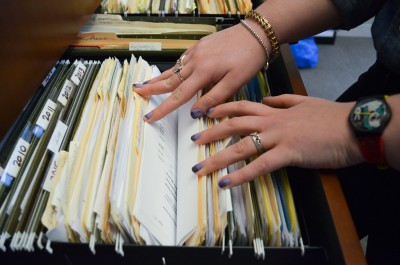
The Massachusetts Senate unanimously passed a public records reform bill that will update the state’s current public records law after nearly 40 years, according to a Thursday press release from the American Civil Liberties Union of Massachusetts.
In the release, Carol Rose, executive director of the ACLU of Massachusetts, applauded the Senate for its efforts to improve the Massachusetts legislature.
“Thank you to the Senate champions of good government for paving the way to greater government transparency with this strong bill,” Rose said in the release. “The Senate version of the public records bill goes a long way toward restoring open and transparent government in Massachusetts, but it’s not over yet.”
Rose said in the release that the bill will require more support before reaching a final approval.
“We need to keep public pressure on both the House and Senate through the conference committee to ensure that an even stronger final bill reaches the Governor’s desk,” Rose said in the release.
According to the release, if the new version is passed, the public records law will award attorneys’ fees to citizens whose access to public records is wrongly denied, limit the fees that agencies can charge to access records and require agencies to respond to requests within 10 days.
Massachusetts Sen. Jason Lewis (D-Winchester) said the bill would be a step toward change for the commonwealth’s public records law.
“I was very pleased that the Senate passed the bill yesterday with a unanimous vote, which means of course that it was bipartisan,” Lewis said. “I believe it’s a very carefully crafted and strong bill that will, after more than 40 years, bring our public records law into the 21st century.”
When asked about the schedule for the bill’s final approval, Lewis said there is “no specific timeframe.”
“My hope will be that it would all happen in the next few months,” Lewis said.
Fred Bayles, a professor at Boston University’s College of Communication, said the history of the Massachusetts public records law has prevented public records laws from being strongly enforced.
“In Massachusetts, which is one of the few states in the country that does it, the executive branch, the legislature and the judiciary are exempt, so there are many records that the public can’t see,” Bayles said.
Bayles said this will remain the case even after the bill is enacted.
“The new changes that are being proposed, the Senate and House versions, they still don’t open up those records,” Bayles said. “It’s somewhat surprising and troubling that Massachusetts is so far behind the rest of the country when it comes to open records laws.”
Bayles said public records are necessary for practicing journalists who use the information to complete their articles.
“Public records tell us what the agencies of government are doing,” Bayles said. “We can only, as journalists, provide context and background if we have those numbers available to us.”
Several Boston residents agreed that the bill would be beneficial for both the Massachusetts government and its citizens.
Jay Joynes, 34, of East Boston, said the bill would promote a better relationship between the government and the community.
“Transparency is important,” Joynes said. “Anything that will create access and will lead to community members being more engaged will carry very little negatives.”
Lewis Liu, 22, of Back Bay, said it’s important for the public to have access to as much information as possible.
“I approve [of] it,” he said. “It’s good to have access to information and that nothing is kept secret.”
Rebecca Kreshak, 24, of Allston, said she has mixed feelings about the bill making public records more accessible.
“It’s not always helpful to have all of this information readily available,” she said. “I almost feel like is there a way in which it can be more nuanced where not everything is accessed.”
Kreshak added that there should be boundaries for how much public record access individuals can have.
“Maybe if we had a more barriered access, if that makes sense,” Kreshak said. “You can get it, but there needs to be criteria before you can gain access to anything.”




